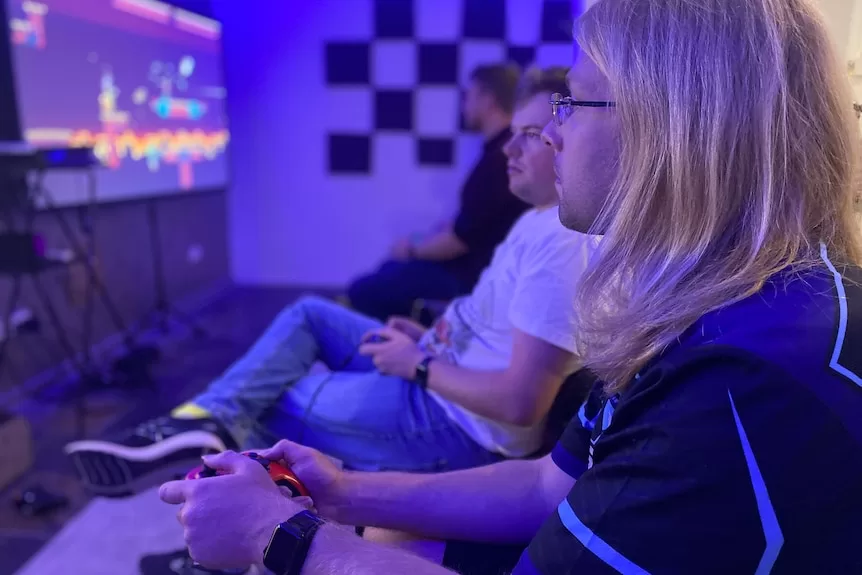He struggled through school, feared he wouldn’t have coped at university, and lives with a genetic condition, but somehow Will Golding has used his disability to create his dream career.
But it didn’t come easily.
The 25-year-old was paying a support worker through the National Disability Insurance Scheme (NDIS) for years to help him become more social.
Instead, he would spend for more than 12 hours a day alone in his room, playing video games to manage the isolation.
Will said it was a byproduct of NDIS carers who were too inexperienced, too young, and turned over too quickly to know what to do with a young neurodiverse adult.
“Some of them were 18, some of them were just about to turn 18, and a lot of them weren’t really qualified at all,” he said.
Will lives with XXY Syndrome, or Klinefelter Syndrome, which affects around 1 in 1,000 boys and men.
It’s commonly misdiagnosed as autism because it has similar symptoms, like language difficulty and behavioural problems.
Will had been hoping his NDIS support would build his confidence and independence to help him get a job after leaving school.
But he churned through support worker after support worker, which “then led to a bit of depression”.
“When they leave, you feel like you’ve lost a friend,” he said.
“There wasn’t anything set up for me to expand my horizons to make friendships across different areas of the community.”
So Will took matters into his own hands – literally.
An answer in a room full of gamers
He now runs video gaming atrium Ignition Gamers in Canberra for young neurodiverse adults who struggle to find a community after leaving school.
“We have a client here who was gaming about 13, 14 hours a day straight to the point where his muscles actually atrophied, and he was going to a physiotherapist,” Will said.
“You start to lose a lot of the communication skills if you’re talking to someone behind the screen – a lot of tonality, a lot of facial expressions.”
But he said gaming in person makes a world of difference for the dozens of neurodiverse gamers who now flock to his sessions.
“They can understand if someone’s frustrated, they can understand if someone’s sad, they can understand that someone’s happy because they can see their facial expressions from that,” he said.
“They also become a lot more outgoing … and then slowly, they become interested in … going out and seeing other new people.”
Some NDIS workers ‘don’t know much’
Will’s mother Claire, who helped establish Ignition Gamers with her son three years ago, said the group acted as a social therapy some NDIS carers had failed to provide.
“It teaches self-regulation, collaboration, consultation, strategy, understanding how to deal with other people and being in a group,” she said.
“We were finding that the workers coming to help him were unqualified, very young, didn’t really know much about autism or mental health and didn’t really understand how the NDIS worked.”
Disability care expert Dr Megan Topping said some service providers underestimated the importance of a good worker-participant match.
“So much of what makes support ‘quality’ is that human connection,” Dr Topping said.
“Providers are getting bigger and bigger … but with that comes less personalised support, less seeing that person as an individual, and less finding the right support for that person.
“These are members of society, it’s not a way to make money.”
Dr Topping said key complaints about carers were their high turnover and a failure to treat participants as ‘real people’.
“It becomes quite evident when support workers don’t want to be there,” she said.
“They’re on their phone, they’re distracted, that’s something that comes up a lot.
“There are some fabulous support workers out there … but unfortunately people can’t rely on the quality of support being consistent.”
Dr Topping is calling for the NDIS to take seriously people with lived experience, and for the disability community to be more involved in decisions about their own care.
That community involvement is part of Ignition Gaming’s success, which now employs several of its original participants.
Amid the buzz of a Friday afternoon video gaming session, Claire said it was a relief to know her son would soon head to the pub across the road to have a soft drink with his friends.
That simple activity, she said, would not have been possible if she and Will had accepted the NDIS care they had been getting.
“Systemically, society isn’t really geared to help kids who are falling through the gaps,” she said.
“It’s important for the NDIS to understand that … social interaction is important.
“It’s not an add-on or a luxury to go and meet people in a social setting.”
